#writing reference writing resources
Explore tagged Tumblr posts
Text
Fantasy Guide to Royal Children - Heirs and Spares
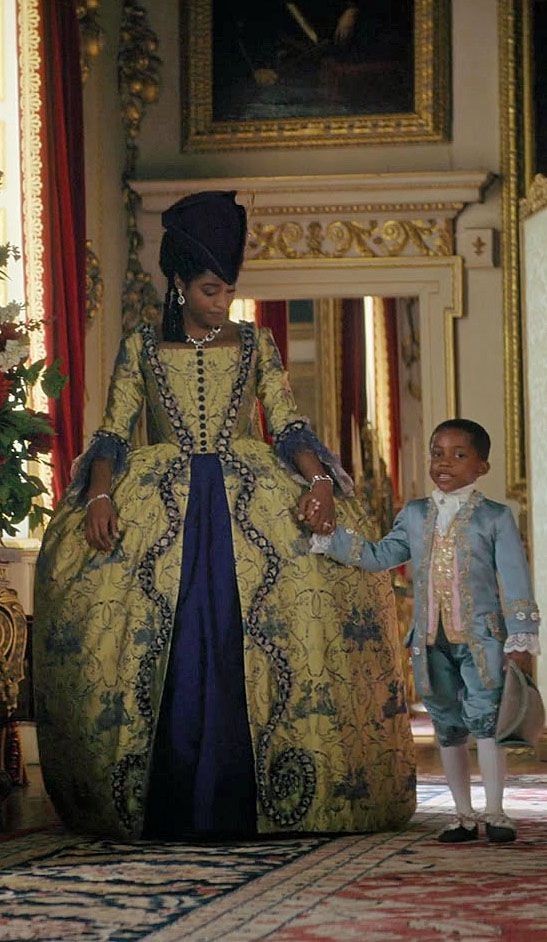
The lives of Princesses and Princes are of interest to most fantasy writers, it's where many of our heroes, side characters and antagonists hail from. But what is there life like? Is it always ballgrowns and servants? Or something more?
A Strict Order of Precedence

The first thing to know about royal children and siblings is that there's a very strict precedence of importance. Is it fair? No. But this is a system, it doesn't have to be fair. The heir comes first without argument. They are the most important child, they are always greeted first, they are the one to stand next to the monarch or their parents at occasions, they literally go first - and this doesn't change with age, if the heir is the youngest, they still have precedence over their siblings. After the heir, order of predence goes by age and the order effects the life of the children. For example, the older sister will marry begore any of her sisters. This order of deference will be so engrained in your character's life that they will believe it the norm and rarely question it, it probably won't spark any in-fighting.
Accommodation & Staff

Royal children are usually raised one of two ways. Either they are raised at court, in the same Palace as their parents or they are raised away from court under the care of trusted servants. Being raised away from their parents isn't a sign of remoteness or dislike or terrible parenting, it was a way of break a child into the constraints of royal life while giving them freedom of scrunity or danger. Usually these children are raised in the countryside for their health, as cities are usually cesspits for disease. Their parents would come to visit them or allow them to visit them at court. Children raised at court are raised with a higher level of scrunity and attention. They will be in the public eye.
Royal children will always be surrounded by staff. There will be nurses to wash and dress them, nannies to discipline and direct them, guards to protect them and usually, a guardian known as a governess to run their household and care for their needs. Staff are not allowed to hit royal children and must obey their commands. Some royal children were very close to their staff:
Kat Ashley and Elizabeth I
Baroness Lehzen and Queen Victoria
Klementy Grigorievich Nagorny and the Tsarevich Alexei Nikolaevich
Lala Bill and Prince John
However, some royal children faced neglect from their staff. George VI was abused by his nanny, who would pinch him during important occasions, openly favour his elder brother over him and deny him food, which many have been a cause of his speech impediment. After the Russian Revolution, another of the Tsarevich's nannies proved less loyal than the other. Andrei Yeremeyevich Derevenko abandoned his charge, but not before ordering the boy around and insulting him.
Day to Day Life

Royal children would be educated withing their home by tutors. They would usually take lessons all together (the heir may take other lessons). A royal child would recieve an education in languages, arithmetic, geography, etiquette, dancing, music, sports such as riding and literature. Sometimes they would even share lessons with the children of trusted nobles or their cousins. Only the heir will be taught statecraft and how to reign. There is no rhyme nor reason a spare would learn how to rule.
Some royal children are taught the value of their position. Many royal children will be raised strictly to adhere to their social standing and their place in it. Some children may be raised in isolation, kept from mingling and raised to think of themselves as higher than those around them. Some royal families preferred to raise their children as "normal" as possible. The last Romanov children slept in camp beds, with no pillows and we're expected to tidy their own rooms and help the servants. They didn't even use their proper titles, they were called by their names and given a tight monthly allowance to spend. Alexandra of Denmark and her sisters used to make their own clothes. Some royal children could even be encouraged to play with the children of servants and staff as well as nobility (Kolya Derevenko and Tsarevich Alexei Nikolaevich, Winifred Thomas and Prince John). Companionship was a great honour for noble and common child alike as sometimes, they would be invited to live or be educated alongside by the royal children.
Royal children will not undertake royal duties until they are of age. Younger children be be present for large scale events such as jubilees but would not be expected to partake in any duties themselves. When they are of age, they will usually be granted an annual allowance, be invited to social events, invited to be patrons of charities and participate in royal duties.
Heir Vs Spare
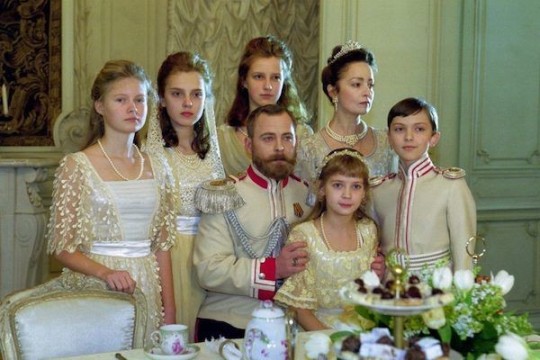
Heirs have more responsibility, all the prestige, more power but they have less freedom, less room to explore their own lives and be expected to always be the epitome of perfect. Heirs will be given responsibilities in government, sitting in on state meetings or undertaking state duties.
Spares have little in the way of real power but have the ability to live less regimental lives and gave more agency in their personal lives. Spares may act as ambassadors to other nations or undertake state visits on behalf of the monarchy or even take positions in the army. Spares are encouraged to find positions to support themselves outside the family, either in a marriage or undertaking some service to the country. Spares who stay in the country, tend to act as unofficial advisers to their sibling when they become monarch.
All Grown Up

When royal children grow up, there are usually certain expectations and limitations.
Heirs will be married quickly, the lineage must be secure. Heirs will usually marry either as part of a political alliance or marry somebody suitable - from a good family, the right background, and able to fit into a certain mould (i.e malleable, amiable and loyal). They will be expected to focus on the country, it's needs and support the monarch at all times. Their social circles will be scruntised, their every move will be noted and remarked upon. Heirs will never gave to worry about funding their lifestyle, the Crown is their job and it supports them.
Spares can marry or remain single if they choose, (but if the monarch instructs them go marry they must). Spares can travel, they can be idle, they can even persue amusements not permitted for the heir. Spares can win glory on the battlefield and mix with all sorts of people. That isn't to say spares are useless, spares often occupy very important spaces in society and government. Spares will usually take these positions not for just status but also for the pay. This is why spares are granted royal titles such as dukedoms (they can make money off the lands, be able to build a dynasty for themselves and their heirs and gain status).
#Fantasy Guide to heirs and Spares#Fantasy Guide to Royal Children#Fantasy Guide#write#writing#writeblr#writing resources#writing reference#writing advice#writers#writing advice writing resources#spilled ink#Writing reference writing resources#Writing resources writing reference#Writing advice writing reference#Writing advice writing resource#Royal children#Writing royal characters#Royalty#Writing royalty#Writing royals
3K notes
·
View notes
Text
sometimes you need dialogue tags and don't want to use the same four


#they're like synonyms and adjacent words and some of them only loosely fall into the category shown i just needed to stick them somewhere#fanfic writing#writing#creative writing#writers on tumblr#writing dialogue#writing reference#writing tips#synonyms#writing resources#for future reference
174K notes
·
View notes
Text
a list of 100+ buildings to put in your fantasy town
academy
adventurer's guild
alchemist
apiary
apothecary
aquarium
armory
art gallery
bakery
bank
barber
barracks
bathhouse
blacksmith
boathouse
book store
bookbinder
botanical garden
brothel
butcher
carpenter
cartographer
casino
castle
cobbler
coffee shop
council chamber
court house
crypt for the noble family
dentist
distillery
docks
dovecot
dyer
embassy
farmer's market
fighting pit
fishmonger
fortune teller
gallows
gatehouse
general store
graveyard
greenhouses
guard post
guildhall
gymnasium
haberdashery
haunted house
hedge maze
herbalist
hospice
hospital
house for sale
inn
jail
jeweller
kindergarten
leatherworker
library
locksmith
mail courier
manor house
market
mayor's house
monastery
morgue
museum
music shop
observatory
orchard
orphanage
outhouse
paper maker
pawnshop
pet shop
potion shop
potter
printmaker
quest board
residence
restricted zone
sawmill
school
scribe
sewer entrance
sheriff's office
shrine
silversmith
spa
speakeasy
spice merchant
sports stadium
stables
street market
tailor
tannery
tavern
tax collector
tea house
temple
textile shop
theatre
thieves guild
thrift store
tinker's workshop
town crier post
town square
townhall
toy store
trinket shop
warehouse
watchtower
water mill
weaver
well
windmill
wishing well
wizard tower
#worldbuilding#setting prompts#writer resources#writing inspiration#writing prompts#scene settings#writing reference#writing ideas#prompt list#creative writing#writing community#writer prompts#writing tips#world#fantasy world#fantasy worldbuilding#high fantasy#world building#epic fantasy#writing fantasy
114K notes
·
View notes
Text
When your Character...
Gets into: A Fight ⚜ ...Another Fight ⚜ ...Yet Another Fight
Hates Someone ⚜ Kisses Someone ⚜ Falls in Love
Calls Someone they Love ⚜ Dies / Cheats Death ⚜ Drowns
is...
A Ballerina ⚜ A Child ⚜ Interacting with a Child ⚜ A Cheerleader
A Cowboy ⚜ A Genius ⚜ A Lawyer ⚜ A Pirate ⚜ A Spy
A Wheelchair User ⚜ A Zombie ⚜ Beautiful ⚜ Dangerous ⚜ Drunk
Funny ⚜ In a Coma ⚜ In a Secret Society ⚜ Injured ⚜ Shy
needs...
A Magical Item ⚜ An Aphrodisiac ⚜ A Fictional Poison
A Coping Strategy ⚜ A Drink ⚜ A Medicinal Herb ⚜ A Mentor
Money ⚜ A Persuasion Tactic ⚜ A Quirk ⚜ To be Killed Off
To Become Likable ⚜ To Clean a Wound ⚜ To Self-Reflect
To Find the Right Word, but Can't ⚜ To Say No ⚜ To Swear
loves...
Astronomy ⚜ Baking ⚜ Cooking ⚜ Cocktails ⚜ Food ⚜ Oils
Dancing ⚜ Fashion ⚜ Gems ⚜ Herbal Remedies ⚜ Honey
Mushrooms ⚜ Mythology ⚜ Numbers ⚜ Perfumes
Roses ⚜ Sweets ⚜ To Argue ⚜ To Insult ⚜ To Kiss
To Make False Claims ⚜ Wine ⚜ Wine-Tasting ⚜ Yoga
has/experiences...
Allergies ⚜ Amnesia ⚜ Bereavement ⚜ Bites & Stings
Bruises ⚜ Caffeine ⚜ CO Poisoning ⚜ Color Blindness
Facial Hair ⚜ Fainting ⚜ Fevers ⚜ Food Allergies
Food Poisoning ⚜ Fractures ⚜ Frostbite ⚜ Hypothermia
Injuries ⚜ Jet Lag ⚜ Kidnapping ⚜ Manipulation ⚜ Mutism
Pain ⚜ Paranoia ⚜ Poisoning ⚜ More Pain & Violence
Scars ⚜ Trauma ⚜ Viruses ⚜ Wounds
[these are just quick references. more research may be needed to write your story...]
Writing Resources PDFs
#requested#writing reference#character development#writeblr#dark academia#spilled ink#writing prompts#writing inspiration#writing ideas#creative writing#compilation#fiction#light academia#literature#writers on tumblr#writing prompt#poets on tumblr#writing tips#writing advice#writing resources#updated: december 2024
25K notes
·
View notes
Text
Writing Description Notes:
Updated 9th September 2024 More writing tips, review tips & writing description notes
Facial Expressions
Masking Emotions
Smiles/Smirks/Grins
Eye Contact/Eye Movements
Blushing
Voice/Tone
Body Language/Idle Movement
Thoughts/Thinking/Focusing/Distracted
Silence
Memories
Happy/Content/Comforted
Love/Romance
Sadness/Crying/Hurt
Confidence/Determination/Hopeful
Surprised/Shocked
Guilt/Regret
Disgusted/Jealous
Uncertain/Doubtful/Worried
Anger/Rage
Laughter
Confused
Speechless/Tongue Tied
Fear/Terrified
Mental Pain
Physical Pain
Tired/Drowsy/Exhausted
Eating
Drinking
Warm/Hot
#creative writers#creative writing#fanfic review#fanfiction#fanfiction tips#helping writers#how to write#references for writers#wingfic#writer#writers#writers and poets#writers community#writers corner#writers of tumblr#writers on tumblr#writing#writing advice#writing community#writing help#writing inspiration#writing life#writing prompts#writing resources#writing tips#writing tips and tricks#writing description#descriptive writing
45K notes
·
View notes
Text
Other Words for "Look" + With meanings | List for writers
Many people create lists of synonyms for the word 'said,' but what about the word 'look'? Here are some synonyms that I enjoy using in my writing, along with their meanings for your reference. While all these words relate to 'look,' they each carry distinct meanings and nuances, so I thought it would be helpful to provide meanings for each one.
Gaze - To look steadily and intently, especially in admiration or thought.
Glance - A brief or hurried look.
Peek - A quick and typically secretive look.
Peer - To look with difficulty or concentration.
Scan - To look over quickly but thoroughly.
Observe - To watch carefully and attentively.
Inspect - To look at closely in order to assess condition or quality.
Stare - To look fixedly or vacantly at someone or something.
Glimpse - To see or perceive briefly or partially.
Eye - To look or stare at intently.
Peruse - To read or examine something with great care.
Scrutinize - To examine or inspect closely and thoroughly.
Behold - To see or observe a thing or person, especially a remarkable one.
Witness - To see something happen, typically a significant event.
Spot - To see, notice, or recognize someone or something.
Contemplate - To look thoughtfully for a long time at.
Sight - To suddenly or unexpectedly see something or someone.
Ogle - To stare at in a lecherous manner.
Leer - To look or gaze in an unpleasant, malicious way.
Gawk - To stare openly and stupidly.
Gape - To stare with one's mouth open wide, in amazement.
Squint - To look with eyes partially closed.
Regard - To consider or think of in a specified way.
Admire - To regard with pleasure, wonder, and approval.
Skim - To look through quickly to gain superficial knowledge.
Reconnoiter - To make a military observation of a region.
Flick - To look or move the eyes quickly.
Rake - To look through something rapidly and unsystematically.
Glare - To look angrily or fiercely.
Peep - To look quickly and secretly through an opening.
Focus - To concentrate one's visual effort on.
Discover - To find or realize something not clear before.
Spot-check - To examine something briefly or at random.
Devour - To look over with eager enthusiasm.
Examine - To inspect in detail to determine condition.
Feast one's eyes - To look at something with great enjoyment.
Catch sight of - To suddenly or unexpectedly see.
Clap eyes on - To suddenly see someone or something.
Set eyes on - To look at, especially for the first time.
Take a dekko - Colloquial for taking a look.
Leer at - To look or gaze in a suggestive manner.
Rubberneck - To stare at something in a foolish way.
Make out - To manage to see or read with difficulty.
Lay eyes on - To see or look at.
Pore over - To look at or read something intently.
Ogle at - To look at in a lecherous or predatory way.
Pry - To look or inquire into something in a determined manner.
Dart - To look quickly or furtively.
Drink in - To look at with great enjoyment or fascination.
Bask in - To look at or enjoy something for a period of time.
#on writing#creative writing#writing#writing tips#writers block#how to write#thewriteadviceforwriters#writeblr#writers and poets#writers on tumblr#novel writing#fiction writing#romance writing#writing advice#writing blog#writing characters#writing community#writing help#writing ideas#writing inspiration#writing guide#writing prompts#writing a book#writing resources#writing reference#writing tips and tricks#writers#writing tools#writing life#writing software
19K notes
·
View notes
Text
words for when your characters ______
Agree
accede, acceptance, accord, acknowledgment, acquiescence, align, avowal, bear, cohere, compromise, consent, contract, draft, enlist, give in/give up, go along/go along with, grant, negotiate, unanimous, yield
Deny
abjure, abuse, affront, attack, backstab, bad-mouth, belie, blacken, blemish, confront, curse, darn, defamation, defile, demur, denigrate, detract, dig, disclaim, discountenance, disgrace, disown, disparagement, downplay, explode, flout, fulminate, gainsay, gird, invective, jeer, lament, lecture, malign, minimize, mouth, needle, oppose, protest, put down, put-down, rebuff, refute, remonstrate, renunciation, run down, satirize, scold, show up, sit-in, slander, smear, snap, snub, squeal, sully, swearing, taunt, tirade, turn, underestimate, vituperation, write off, yammer
Explain
account for, admit, apprise, cite, clarify, come clean, concede, confirm, corroborate, defense, demonstrate, dilate, elucidate, enlighten, evidence, expand, explicate, gloss, illustrate, itemize, let on, palliate, plea, prove, recite, simplify, speak out/speak up, spell out, translator, warrant
Fabricate
aspersion, belie, disprove, profane
Inform
acknowledge, address, advertise, allow, allusion, apprise, bare, betrayal, blab, breathe, briefing, broadcast, chronicle, clue, come out with, confession, convey, debunk, define, detail, dictate, divulge, expose, feature, furnish, give, gossip, hint, intimate, issue, lecture, newscaster, orate, out of the closet, pass, post, proclaim, promulgate, publication, publish, release, reveal, show up, speak, spill, squeal, talk, tip, uncover, unveil, weatherperson, whisper
Instruct
bar, educate, prescribe
Persuade
advance, argument, bend, budge, carry, coerce, convince, discourage, draw, drum up, elicit, entice, forward, goad, hammer away/hammer into, induce, influence, invite, lobby, motivate, negotiation, pitch, prevail upon/prevail on, prompt, reason, spur, sway, urge, win/win over
Promise
assurance, avow, commitment, ensure, go back/go back on, oath, portend, vouch, warrant, word
Suggest
advice, advocate, ask, come up with, connote, drum into, exhort, fish for, get at, guide, imply, insinuate, moralize, move, nomination, pontificate, preach, propose, recommend, urge
Praise
accent, acclamation, accredit, adulation, apotheosis, applause, benediction, bless, champion, citation, commend, compliment, congratulations, credit, dedicate, deify, elevate, endorse, eulogize, exalt, extol, flatter, flattery, glorify, homage, laud, lionize, obsequy, plaudits, puff, salute, thanks, tribute, worship
Warn
admonish, alert, caution, caveat, defy, enjoin, exhortation, foreboding, foretell, page, remind, warning
NOTE
The above are concepts classified according to subject and usage. It not only helps writers and thinkers to organize their ideas but leads them from those very ideas to the words that can best express them.
It was, in part, created to turn an idea into a specific word. By linking together the main entries that share similar concepts, the index makes possible creative semantic connections between words in our language, stimulating thought and broadening vocabulary. Writing Resources PDFs
Source ⚜ Writing Basics & Refreshers ⚜ On Vocabulary
#vocabulary#langblr#writeblr#writing reference#dialogue#spilled ink#creative writing#dark academia#writers on tumblr#poets on tumblr#poetry#literature#writing tips#writing prompt#writing#words#lit#studyblr#fiction#light academia#writing resources
11K notes
·
View notes
Text
Writing Worksheets & Templates
will update this every few weeks/months. alternatively, here are all my tagged Writing Worksheets & Templates
Chapter Outline ⚜ Character- or Plot-Driven Story
Death & Sacrifice ⚜ Magic & Rituals ⚜ Plot-Planning
Editing: Sentence Check ⚜ Writing Your Novel: 20 Questions
Tension ⚜ Thought Distortions ⚜ What's at Stake
Character Development
50 Questions ⚜ Backstory ⚜ Character Creation
Antagonist; Villain; Fighting ⚜ Protagonist & Antagonist
Character: Change; Adding Action; Conflict
Character: Creator; Name; Quirks; Flaws; Motivation
Character Profile (by Rick Riordan) ⚜ Character Sheet Template
Character Sketch & Bible ⚜ Interview your Character
Story-Worthy Hero ⚜ "Well-Rounded" Character Worksheet
Worldbuilding
20 Questions ⚜ Decisions & Categories ⚜ Worksheet
Setting ⚜ Dystopian World ⚜ Magic System (AALC Method)
Templates: Geography; World History; City; Fictional Plant
References: Worldbuilding ⚜ Plot ⚜ Character ⚜ Writing Resources PDFs
all posts are queued. send questions/requests here.
#writing tips#writeblr#dark academia#spilled ink#writers on tumblr#fiction#creative writing#character development#character building#original character#character design#booklr#writing prompts#novel#worldbuilding#writing inspiration#writing ideas#bookblr#writing reference#writing prompt#writing resources
10K notes
·
View notes
Text
A general cane guide for writers and artists (from a cane user, writer, and artist!)
Disclaimer: Though I have been using a cane for 6 years, I am not a doctor, nor am I by any means an expert. This guide is true to my experience, but there are as many ways to use a cane as there are cane users!
This guide will not include: White canes for blindness, crutches, walkers, or wheelchairs as I have no personal experience with these.
This is meant to be a general guide to get you started and avoid some common mishaps/misconceptions in your writing, but you absolutely should continue to do your own research outside of this guide!
This is NOT a medical resource!!! And never tell a real person you think they're using a cane wrong!
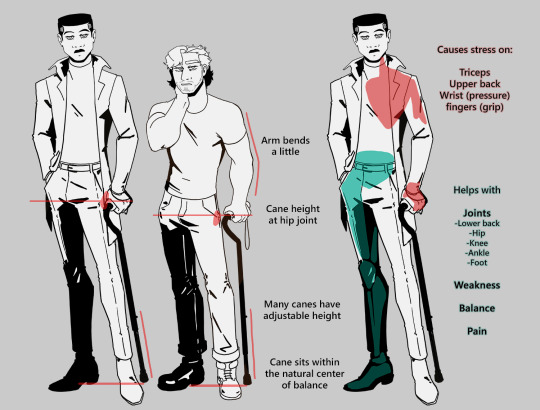
The biggest recurring problem I've seen is using the cane on the wrong side. The cane goes on the opposite side of the pain! If your character has even-sided pain or needs it for balance/weakness, then use the cane in the non-dominant hand to keep the dominant hand free. Some cane users also switch sides to give their arm a rest!
A cane takes about 20% of your weight off the opposite leg. It should fit within your natural gait and become something of an extension of your body. If you need more weight off than 20%, then crutches, a walker, or a wheelchair is needed.
Putting more pressure on the cane, using it on the wrong side, or having it at the wrong height can make it less effective, and can cause long term damage to your body from improper pressure and posture. (Hugh Laurie genuinely hurt his body from years of using a cane wrong on House!)
(some people elect to use a cane wrong for their personal situation despite this, everyone is different!)
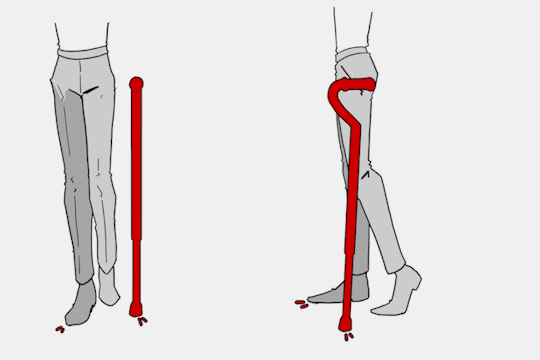
(an animated GIF of a cane matching the natural walking gait. It turns red when pressure is placed on it.)
When going up and down stairs, there is an ideal standard: You want to use the handrail and the cane at the same time, or prioritize the handrail if it's only on one side. When going up stairs you lead with your good leg and follow with the cane and hurt leg together. When going down stairs you lead with the cane and the bad leg and follow with the good leg!
Realistically though, many people don't move out of the way for cane users to access the railing, many stairs don't have railings, and many are wet, rusty, or generally not ideal to grip.
In these cases, if you have a friend nearby, holding on to them is a good idea. Or, take it one step at a time carefully if you're alone.
Now we come to a very common mistake I see... Using fashion canes for medical use!
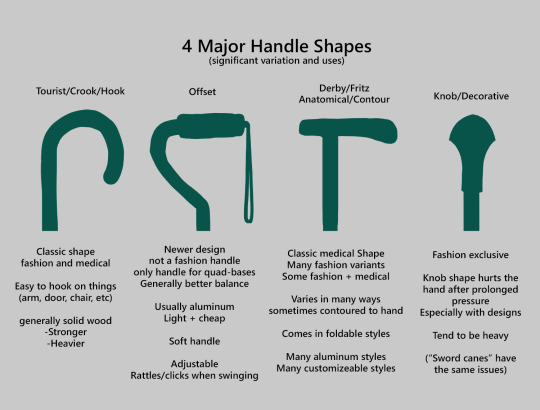
(These are 4 broad shapes, but there is INCREDIBLE variation in cane handles. Research heavily what will be best for your character's specific needs!)
The handle is the contact point for all the weight you're putting on your cane, and that pressure is being put onto your hand, wrist, and shoulder. So the shape is very important for long term use!
Knob handles (and very decorative handles) are not used for medical use for this reason. It adds extra stress to the body and can damage your hand to put constant pressure onto these painful shapes.
The weight of a cane is also incredibly important, as a heavier cane will cause wear on your body much faster. When you're using it all day, it gets heavy fast! If your character struggles with weakness, then they won't want a heavy cane if they can help it!
This is also part of why sword canes aren't usually very viable for medical use (along with them usually being knob handles) is that swords are extra weight!
However, a small knife or perhaps a retractable blade hidden within the base might be viable even for weak characters.
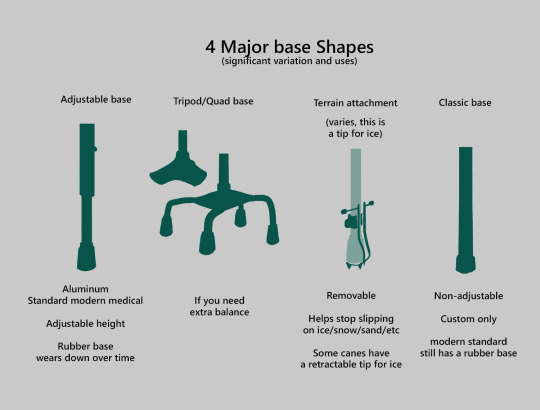
Bases have a lot of variability as well, and the modern standard is generally adjustable bases. Adjustable canes are very handy if your character regularly changes shoe height, for instance (gotta keep the height at your hip!)
Canes help on most terrain with their standard base and structure. But for some terrain, you might want a different base, or to forego the cane entirely! This article covers it pretty well.
Many cane users decorate their canes! Stickers are incredibly common, and painting canes is relatively common as well! You'll also see people replacing the standard wrist strap with a personalized one, or even adding a small charm to the ring the strap connects to. (nothing too large, or it gets annoying as the cane is swinging around everywhere)
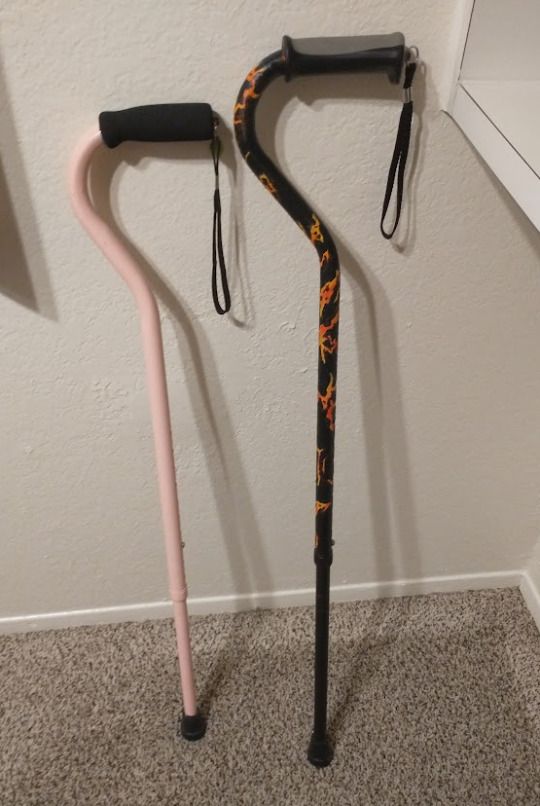
(my canes, for reference)
If your character uses a cane full time, then they might also have multiple canes that look different aesthetically to match their outfits!
When it comes to practical things outside of the cane, you reasonably only have one hand available while it's being used. Many people will hook their cane onto their arm or let it dangle on the strap (if they have one) while using their cane arm, but it's often significantly less convenient than 2 hands. But, if you need 2 hands, then it's either setting the cane down or letting it hang!
For this reason, optimizing one handed use is ideal! Keeping bags/items on the side of your free hand helps keep your items accessible.
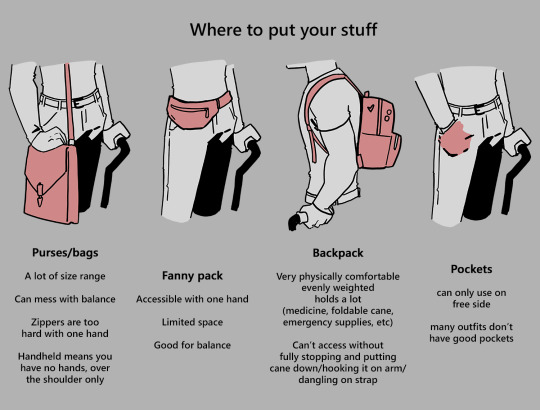
When sitting, the cane either leans against a wall or table, goes under the chair, or hooks onto the back of the chair. (It often falls when hanging off of a chair, in my experience)
When getting up, the user will either use their cane to help them balance/support as they stand, or get up and then grab their cane. This depends on what it's being used for (balance vs pain when walking, for instance!)
That's everything I can think of for now. Thank you for reading my long-but-absolutely-not-comprehensive list of things to keep in mind when writing or drawing a cane user!
Happy disability pride month! Go forth and make more characters use canes!!!
#mobility aid#cane user#writing tips#writing advice#drawing tips#art tutorial#art tips#art reference#art resources#art help#my art#long post
93K notes
·
View notes
Text
Free Manual Wheelchair Reference Models

ID: A banner with grey 3D models of 5 kinds of manual wheelchairs in a line in front of the disability pride flag and text that reads "Manual Wheelchair References" /End ID
For disability pride month, I decided to release a pack of 3D manual wheelchair models.
The pack includes 5 wheelchairs:
2 Active urban-style chairs (one of which includes a smart drive)
1 off-road active chair
1 children's wheelchair
and 1 standard "hospital" wheelchair).
All the wheelchairs are based off either wheelchairs I or friends of mine have used
Downloadable here!
or on the Clip Studio Paint Asset Store (ID 2097442) (there's been an issue with the CSP version, but the models in the download folder can be imported into clip studio paint until I can fix it)
More info about the download contents below:
The first download link includes the original .Blend file with all 5 chairs, as well as individual .obj or .fbx files the chairs (All but 1 have an .obj file, as they're only meshes. The chair with the smart drive is rigged, which is why it has an .Fbx file instead so it will retain that information) as well as a "read me" file that explains in more depth what kind of disability/character/lifestyle each chair is made for (These are just what I had in mind when I designed them, they are usable by other characters who don't fit the suggestions for the most part!) I wanted to include the Read Me contents in the CSP Asset Store listing, but CS said it was too long lol.
Also, as the title says, these files are free to use! While it's not mandatory, I would appreciate credit if you use them (or even just a tag so I can see the cool art you make with them!!)
I actually made these ages ago, the original plan was to use them in a series of posts then release the pack, but I never got around to making the series and so they've just been sitting here. I took a day off from art fight attacks to clean them all up and get them ready to post. If you experience any issues, let me know and I'll try to fix it up.
I had a couple more that were supposed to be in the pack including a sports (basketball/Tennis) wheelchair and some different styles of wheelchair, but I think the files corrupted so once I fix (or remake) them, I'll probably make a second pack.
If you have any issues, please let me know!
#Writing Disability With Cy Cyborg#Disability in art#wheelchair#wheelchair user#disability#disabled#disability representation#mobility aids#drawing disability#drawing wheelchairs#art reference#art resources#Resources#manual wheelchair#art stuff#disabled artist#3d#3d model#blender#disability awareness#disabilities#disability in media
11K notes
·
View notes
Text
So you know when you're writing a scene where the hero is carrying an injured person and you realize you've never been in this situation and have no idea how accurate the method of transportation actually is?
Oh boy, do I have a valuable resource for you!
Here is a PDF of the best ways to carry people depending on the situation and how conscious the injured person needs to be for the carrying position.
Literally a life saver.
(No pun intended.)
#writing tips#writing resources#writing reference#writing research#idk i thought it was cool#superhero#dc fanfic#batman fanfic#bkdk fanfic#fanfic#fan fiction#bakudeku#bkdk#jaytim#this was all for a jaytim fic im writing#it's my first a/b/o smut fic ever#yeehaw#i had to google if there was any way to carry an unconscious person up a ladder alone#i don't think you can#mha fanfic#bnha fanfic#coldflash#jaydick#idk any superhero ship works#im done tagging shit
6K notes
·
View notes
Text
Fantasy Guide to Dowager Queens and Queen Mothers

The King is dead. Long live the next monarch (I guess). Their eldest child is now monarch, their other kids have probably started up lives elsewhere or started careers in the military or such. But what happens their Queen?
Queen Mother vs Dowager Queen

There are two titles the now widowed Queen can take after her husband dies. The first is Dowager Queen or Queen Dowager, which basically means ex-Queen or the previous Queen. The second is Queen Mother, which is the title which can be taken by the mother of the next monarch (this title cannot be granted to step-mothers). Ex-Queens who mothered the current monarch can go for either title if they wish. As for addressing a former Queen, it will still be "Your Majesty" and she would simply be referred to as Queen Firstname.
Life and Perks

The former Queen will move out of the palace after a few weeks. She will take up residence at one of the Crown's many palaces or houses, able to keep on as many servants as she wants - or that is paid for. She can typically do whatever she likes now, she can travel, she can live at court, she can spend her life away from it all in the country. She will have to surrender her official jewelry which sucks. This can lead to trouble such as the tension between Dowager Empress Maria Feodorovna and Empress Alexandra. Dowager Queens and Queen Mothers usually inherited lands and estates from their husband's will, which basically is a way to support them and their lifestyle. They may also recieve money from the Crown annually. However, some Dowager Queens faced some trouble if the new monarch didn't want to provide for them. This often led to conflict.
Duties

The former Queen might also be called in to help the Crown. She might be sent on diplomatic state visits, act as a diplomatic hostess, advise the new monarch and stand in for them at events if needed. The former Queen will also take an active role in the family if she wishes. Some Dowager Queens and Queen Mothers might act as Regents for underage monarchs.
Prospects


Being a Dowager or the Queen Mother is a relatively cushy job. While you lose some influence and prestige, you are still highly ranked but with less responsibility. Most ex-Queens spend their time relaxing and treating themselves while some stayed relevant with taking on full calenders of duties and events. Mostly, as long as you help out occasionally, live a quiet life, you will pretty much have a nice life. However, there have been instances of Dowager Queens and Queen Mothers going a little off the rails. A Dowager Queen without children might leave behind her new country and go home if she wanted to. She would remain Dowager Queen with all the perks unless she remarried. Some young widowed Queens remarried to varying successes (Catherine of Valois, Isabella of Angoulême, Kathryn Parr, Queen Margaret Tudor, Mary Tudor Queen of France).
#Fantasy Guide to Dowager Queens and Queen Mothers#Queen mothers#Dowager Queens#Fantasy Guide#writing#writeblr#writing resources#writing reference#writer#writer's problems#wtwcommunity#writing reference writing resources#Writing reference writing help#Writing help#writing research#Research#Reference#Writing guide
404 notes
·
View notes
Text
Struggling with descriptors? Here are some synonyms to make your scene more interesting!
=========
Afraid
=========
Apprehensive
Dread
Foreboding
Frightened
Mistrustful
Panicked
Petrified
Scared
Suspicious
Terrified
Wary
Worried
=========
Annoyed
=========
Aggravated
Dismayed
Disgruntled
Displeased
Exasperated
Frustrated
Impatient
Irritated
Irked
=========
Angry
=========
Enraged
Furious
Incensed
Indignant
Irate
Livid
Outraged
Resentful
=========
Aversion
=========
Animosity
Appalled
Contempt
Disgusted
Dislike
Hate
Horrified
Hostile
Repulsed
=========
Confused
=========
Ambivalent
Baffled
Bewildered
Dazed
Hesitant
Lost
Mystified
Perplexed
Puzzled
Torn
=========
Disconnected
=========
Alienated
Aloof
Apathetic
Bored
Cold
Detached
Distant
Distracted
Indifferent
Numb
Removed
Uninterested
Withdrawn
=========
Disquiet
=========
Agitated
Alarmed
Discombobulated
Disconcerted
Disturbed
Perturbed
Rattled
Restless
Shocked
Startled
Surprised
Troubled
Turbulent
Turmoil
Uncomfortable
Uneasy
Unnerved
Unsettled
Upset
=========
Embarrassed
=========
Ashamed
Chagrined
Flustered
Guilty
Mortified
Self-conscious
=========
Fatigue
=========
Beat
Burnt out
Depleted
Exhausted
Lethargic
Listless
Sleepy
Tired
Weary
Worn out
=========
Pain
=========
Agony
Anguished
Bereaved
Devastated
Grief
Heartbroken
Hurt
Lonely
Miserable
Regretful
Remorseful
=========
Sad
=========
Depressed
Dejected
Despair
Despondent
Disappointed
Discouraged
Disheartened
Forlorn
Gloomy
Heavy hearted
Hopeless
Melancholy
Unhappy
Wretched
=========
Tense
=========
Anxious
Cranky
Distressed
Distraught
Edgy
Fidgety
Frazzled
Irritable
Jittery
Nervous
Overwhelmed
Restless
Stressed out
=========
Vulnerable
=========
Fragile
Helpless
Insecure
Leery
Reserved
Sensitive
Shaky
=========
Yearning
=========
Envious
Jealous
Longing
Nostalgic
Pining
Wistful
=========
#writerscommunity#writing community#writers community#writing help#creative writing#story writing#fiction writing#writers on tumblr#writeblr#writing#vocabulary#writing tips#helping writers#references for writers#writing reference#writing advice#writing resources#writing tips and tricks#grammar#english language#english#synonyms#linguistics#fanfiction tips#creative writers#fanfic tips#character building#creative expression#motivation#creative inspiration
3K notes
·
View notes
Text
i made a guide to help with ao3 tagging :)

#ao3#fanfiction#fanfic#fanfics#archive of our own#ao3 fanfic#tagging#ao3 tags#resources#reference#writing resources#writing reference
2K notes
·
View notes
Text
Writing Notes & References
Alchemy ⚜ Antidote to Anxiety ⚜ Attachment ⚜ Autopsy
Art: Elements ⚜ Principles ⚜ Photographs ⚜ Watercolour
Bruises ⚜ Caffeine ⚜ Color Blindness ⚜ Cruise Ships
Children ⚜ Children's Dialogue ⚜ Childhood Bilingualism
Dangerousness ⚜ Drowning ⚜ Dystopia ⚜ Dystopian World
Culture ⚜ Culture Shock ⚜ Ethnocentrism & Cultural Relativism
Emotions: Anger ⚜ Fear ⚜ Happiness ⚜ Sadness
Emotional Intelligence ⚜ Genius (Giftedness) ⚜ Quirks
Facial Expressions ⚜ Laughter & Humour ⚜ Swearing & Taboo
Fantasy Creatures ⚜ Fantasy World Building
Generations ⚜ Literary & Character Tropes
Fight Scenes ⚜ Kill Adverbs
Food: Cooking Basics ⚜ Herbs & Spices ⚜ Sauces ⚜ Wine-tasting ⚜ Aphrodisiacs ⚜ List of Aphrodisiacs ⚜ Food History ⚜ Cocktails ⚜ Literary & Hollywood Cocktails ⚜ Liqueurs
Genre: Crime ⚜ Horror ⚜ Fantasy ⚜ Speculative Biology
Hate ⚜ Love ⚜ Kinds of Love ⚜ The Physiology of Love
How to Write: Food ⚜ Colours ⚜ Drunkenness
Jargon ⚜ Logical Fallacies ⚜ Memory ⚜ Memoir
Magic: Magic System ⚜ 10 Uncommon ⚜ How to Choose
Moon: Part 1 2 ⚜ Related Words
Mystical Items & Objects ⚜ Talisman ⚜ Relics ⚜ Poison
Pain ⚜ Pain & Violence ��� Poison Ivy & Poison Oak
Realistic Injuries ⚜ Rejection ⚜ Structural Issues ⚜ Villains
Symbolism: Colors ⚜ Food ⚜ Numbers ⚜ Storms
Thinking ⚜ Thinking Styles ⚜ Thought Distortions
Terms of Endearment ⚜ Ways of Saying "No" ⚜ Yoga
Compilations: Plot ⚜ Character ⚜ Worldbuilding ⚜ For Poets ⚜ Tips & Advice
all posts are queued. will update this every few weeks/months. send questions or requests here ⚜ Writing Resources PDFs
#writing reference#writing inspiration#writeblr#dark academia#spilled ink#literature#writers on tumblr#poets on tumblr#light academia#lit#poetry#writing notes#fiction#novel#booklr#creative writing#writing prompts#writing ideas#worldbuilding#character design#plot#writing resources
16K notes
·
View notes
Note
advice for a character who grips control like a lifeline. who wants to be in charge of every little thing because whenever they're not in control of something something bad could happen. has happened. they can't let a single variable be wild or in someone else's hands
How to Write a Controlling Character
Backstory Rooted in Trauma or Guilt
This character likely has a history that has ingrained the belief that they must be in control or face devastating consequences. Perhaps they once trusted someone else with something crucial—a promise, a responsibility, or a life-altering choice—and that trust was broken in a way that had lasting repercussions. For example, maybe they lost someone because they weren’t “careful enough,” or they experienced a betrayal when they trusted another person’s plan.
They might frequently flash back to this moment, possibly catching themselves thinking, If only I’d been the one in control, this wouldn’t have happened. This memory fuels their need to keep a tight grip on everything, especially if they’re in high-stakes situations.
Rigid Daily Routines and Habits
This character’s day is probably packed with small rituals and routines that give them a sense of security. From double-checking door locks to setting multiple alarms, they rely on routines to give themselves a sense of order. In fact, they might be nearly ritualistic about small actions—checking emails three times before sending, never leaving a task halfway finished, or meticulously arranging their workspace.
Even something as simple as making coffee can become a precise process. If someone moves one of their tools or a file from their desk, they may feel a spike of frustration or even anxiety, seeing it as a disruption to their personal “system.” They could feel that control in their daily life is the only thing keeping chaos at bay.
Intensely Observant of Details and Mistakes
They are hyperaware of mistakes or inefficiencies in others, mentally cataloging things like a coworker’s slight lateness or a friend’s disorganization. They may feel a sense of superiority (or frustration) over people who don’t “have it together” and take it upon themselves to organize or “fix” things for others.
In conversation, they might cut people off or “correct” them even over small points, often justifying this to themselves as necessary. For instance, if someone shares a plan that seems half-formed, this character could immediately dive in, pointing out potential problems or filling in details.
Controlling Relationships and Social Situations
This character struggles in relationships where they aren’t the dominant or organizing force. They might instinctively take over when making plans with friends, micromanaging even casual hangouts to make sure everything goes “right.” For example, they might pick the restaurant, plan the travel route, and check weather forecasts—assuming that if they don’t, no one else will think of these things.
When someone resists their attempts at control, they can respond defensively, often turning cold or resentful, unable to understand why anyone wouldn’t want them to manage the situation. Statements like, “Fine, but don’t blame me if this doesn’t go well,” are frequent in their interactions.
Extreme Anxiety or Panic When Control Is Taken Away
When things go beyond their reach, this character might experience panic, as if they’re suddenly powerless. For instance, if an unexpected roadblock prevents them from handling a task (like a canceled flight they needed to board, or a plan that falls apart), they might spend hours trying to regain control, calling every contact or frantically exploring alternatives.
Their reaction may feel extreme to others. Even minor setbacks—such as a colleague taking initiative on a project or a friend planning something without consulting them—can trigger a disproportionate response, like clenching their fists, pacing, or silently stewing as they feel the situation “slipping.”
Inability to Accept Help or Collaboration
Their controlling nature makes it hard for them to collaborate, as they believe their methods are the only ones that work. For them, accepting help feels like an admission of weakness or failure, so they rarely delegate or ask for assistance. If they do reluctantly accept help, they are constantly supervising or “suggesting” things, making it feel more like they’re still in charge.
In a team setting, they might take on all the major tasks, either out of distrust in others’ abilities or a feeling that no one will match their standards. Their motto could be something like, “If you want something done right, do it yourself,” even if that means working late or burning out.
Reluctance to Show Vulnerability or Need
Since vulnerability and control rarely coexist for them, they avoid showing weakness at all costs, preferring to mask stress or struggles as “just part of the job.” If they do become overwhelmed, they’re more likely to shut people out, saying, “I’ve got it handled,” even if it’s far from true.
When people push them to let go or share the load, they might lash out, accusing others of “just not understanding.” They often see their intense responsibility as a form of sacrifice, justifying their behavior with, “If I don’t handle this, who will?”
#creative writing#writeblr#ask box prompts#how to write a controlling character#how to write#writing tips#writing advice#writing resources#writing help#writing reference#writing prompts#how to#writing tools#writing techniques#writing stuff
2K notes
·
View notes